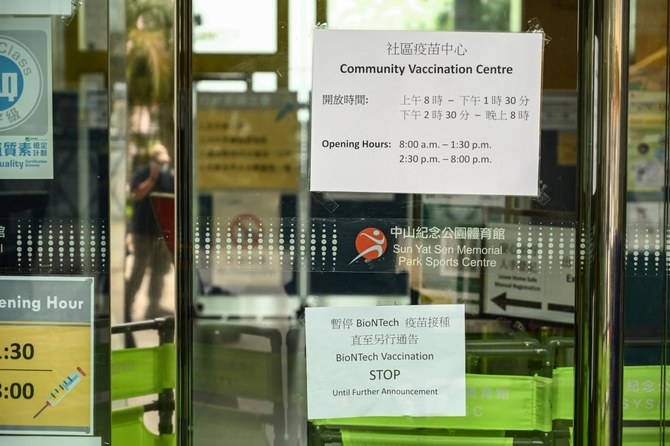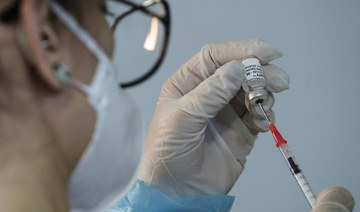HONG KONG: Hong Kong suspended the use of Pfizer/BioNTech’s coronavirus vaccine on Wednesday after being informed some vials from a recent batch had “defective caps” — although authorities said none of the problematic containers were used on residents.
The stoppage, which was also announced by neighboring Macau, is the latest blow in efforts to role out mass vaccination programs against a deadly virus that has killed more than 2.7 million people around the world and hammered the global economy.
Both Chinese cities said their decision came after they were contacted about the issue by Fosun, the Chinese pharmaceutical company that is distributing the Pfizer/BioNTech vaccine in China.
Some vials with the lot number 210102 were found to have defective caps, authorities said.
“The pharmaceutical company said they don’t have any reason to believe that this batch of vaccines has safety risks,” Hong Kong health chief Sophia Chan told reporters.
“The vaccines which we have found to have vial defects prior to injection were dumped. They were not used on residents,” she added.
Many vaccines are shipped in concentrated form inside vials and are then diluted before being administered.
Bottles found to have problematic caps, cracks or other defects were dumped and therefore not used, Hong Kong officials said, adding they decided to suspend the program out of an abundance of caution until their investigation is concluded.
Some Hong Kongers took to social media to say their appointments that day had been canceled and that some vaccination centers were closed.
“I haven’t lost confidence in the vaccine but I’m quite disappointed as I took the day off,” one man, who gave his surname as Wong, told AFP as he arrived at a taped-off center.
Hong Kong authorities said another batch of vaccines with lot number 210104 would be put to one side until the investigation is concluded.
The city had planned to administer second doses within 21 days of the first, but Pfizer’s guidelines allow for a 42-day space between shots giving authorities more time to trace any issues.
Despite being a notoriously packed city, Hong Kong has kept infections low thanks to some of the most stringent quarantine measures in the world, recording just 11,000 infections and 200 deaths since the pandemic began.
Hong Kong began its vaccination drive last month but the public take-up has been slow and ensnared by roiling political unrest.
The city was upended by huge and often violent democracy protests in 2019 that Beijing has responded to with a sweeping crackdown on dissent.
As a result, public trust in Hong Kong’s government is low.
A recent poll said only 37 percent of Hong Kong adults planned to get vaccinated.
As of Tuesday, 403,000 people — about five percent of the city’s population — have had their first shot.
Authorities currently offer China’s Sinovac and the Pfizer/BioNTech vaccine.
Sinovac received fast-track approval despite not publishing peer-reviewed clinical data.
The data available points to an efficacy rate of between 50-80 percent, depending on the studies.
Pfizer says its efficacy rate is 94-95 percent.
The vaccination scheme was opened to anyone above the age of 30 last week after officials struggled to attract enough elderly people and those in priority groups.
Hong Kong leader Carrie Lam has previously lamented the tepid enthusiasm for vaccination and accused critics of “smearing” the Chinese vaccine.
On Tuesday, health authorities banned a local clinic from supplying vaccines after one of its doctors publicly said he would choose Pfizer’s vaccine over Sinovac.
Hong Kong, Macau suspend Pfizer COVID-19 vaccine over packaging flaw
https://arab.news/7n4yd
Hong Kong, Macau suspend Pfizer COVID-19 vaccine over packaging flaw

- Many vaccines are shipped in concentrated form inside vials and are then diluted before being administered
- Authorities said none of the problematic containers were used on residents.
UK polls point to ‘electoral extinction’ for Prime Minister Sunak’s Conservatives

- “Our research suggests that this election could be nothing short of electoral extinction for the Conservative Party,” Chris Hopkins, political research director at Savanta, said
LONDON: Three British opinion polls released late on Saturday presented a grim picture for Prime Minister Rishi Sunak’s Conservative Party, and one pollster warned that the party faced “electoral extinction” in July 4’s election.
The polls come just over halfway through the election campaign, after a week in which both the Conservatives and Labour set out their manifestos, and shortly before voters begin to receive postal ballots.
Sunak surprised many in his own party by announcing an early election on May 22, against widespread expectations that he would wait until later in the year to allow more time for living standards to recover after the highest inflation in 40 years.
Market research company Savanta found 46 percent support for Keir Starmer’s Labour Party, up 2 points on the previous poll five days earlier, while support for the Conservatives dropped 4 points to 21 percent. The poll was conducted from June 12 to June 14 for the Sunday Telegraph.
Labour’s 25-point lead was the largest since the premiership of Sunak’s predecessor, Liz Truss, whose tax cut plans prompted investors to dump British government bonds, pushing up interest rates and forcing a Bank of England intervention.
“Our research suggests that this election could be nothing short of electoral extinction for the Conservative Party,” Chris Hopkins, political research director at Savanta, said.
A separate poll by Survation, published by the Sunday Times, predicted the Conservatives could end up with just 72 seats in the 650-member House of Commons — the lowest in their nearly 200-year history — while Labour would win 456 seats.
The poll was conducted from May 31 to June 13.
In percentage terms, the Survation poll had Labour on 40 percent and the Conservatives on 24 percent, while former Brexit campaigner Nigel Farage’s Reform UK party — a right-wing challenger to the Conservatives — was on 12 percent.
A third poll, by Opinium for Sunday’s Observer and conducted from June 12 to June 14, also showed Labour on 40 percent, the Conservatives on 23 percent and Reform on 14 percent, with the two largest parties yielding ground to smaller rivals.
Britain’s ‘impossible’ refugee visa rules leave children stranded in war zones, charity says

- Organization points to ‘catastrophic failure’ of system
LONDON: Children are being left stranded in war zones due to the “impossible” bureaucratic requirements for one of Britain’s few legal routes for asylum-seekers, a charity has told The Guardian.
The UK government has said that the family reunion process allows refugees to safely reunite with loved ones in the country.
However, a new report from the Refugee and Migrant Forum of East London, a charity that helps vulnerable migrants, reveals that the scheme is “not fit for purpose” and has abandoned applicants, putting them at risk of trafficking, or even death.
RAMFEL reported that when the conflict in Sudan erupted in April 2023, it was assisting 14 people, all of whom were eligible to travel to the UK under the scheme.
More than a year later, eight people remain trapped there, “facing extreme risks.” Several of the children previously fled Eritrea, where men, women, and children face forced mass conscription.
In some cases, teenagers have fled Sudan via irregular routes. One boy was detained in Libya, and another unaccompanied child was trafficked to South Sudan and raped.
The UK government has closed its visa application center in Khartoum but has not waived the requirement for applicants to register their fingerprints and biometric data in person.
“Visa application centers are open and operating in neighboring countries,” a Home Office letter, seen by The Guardian, reads.
“However, travel across Sudan is conducted at your own risk, and under your own discretion, considering whether it is safe to do so,” it added.
Eritrean refugee Yusef, who is living in the UK, shared his efforts to bring his two young brothers, now aged 17 and 14, to join him. They fled to Sudan alone after their mother died and their father was seized by Eritrean authorities.
He told The Guardian: “I made the (family reunion) application but the Home Office was saying that there was not a place to test them for tuberculosis or a visa center in Sudan. They said they couldn’t take them.”
His brothers fled north to Egypt, and Yusef said: “They don’t have anyone. How will they survive? If the police find them asleep, they will take them back to Eritrea and they will be put in prison. They are still in this situation and they’re very scared.”
In October of last year, the Home Office declined to consider a request to bypass biometric enrollment for the children. RAMFEL is currently attempting to have them registered in Cairo.
RAMFEL pointed to the Sudan conflict as an example of the “catastrophic failure” of the family reunion system. The process primarily aids children and spouses of UK residents and can only extend to siblings and other close relatives under a more restrictive scheme.
The charity argues that the flawed system is pushing more refugees toward irregular routes, leading to an increase in small boat crossings over the English Channel, which have reached record levels.
Nick Beales, head of campaigning at RAMFEL, said: “The UK’s family reunion system is not fit for purpose and this report shows that it does not act as an effective safe route for refugees seeking to come to the UK.
“For people in places such as Sudan and Gaza, they are prevented from even applying for family reunion due to the government’s inflexible and unreasonable insistence on them attending non-existing visa application centers.
“This leaves those in conflict zones, including unaccompanied children, with no choice but to take dangerous journeys in search of family reunification.”
RAMFEL called on the next government to create a process that allowed those with loved ones in the UK to swiftly and safely secure visas for legal travel to Britain.
Ukrainian refugees sing Beethoven’s ‘Ode to Joy’ near Swiss summit

- Among the singers were around 50 Ukrainian refugees, some wearing embroidered national dress and crowns of flowers
- “It’s about freedom. I haven’t learned German but I feel a lot of power and freedom and joy,” Anna Haidash, a refugee from Odesa, said
LUCERNE: Dozens of Ukrainian refugees from choirs around Switzerland converged in the city of Lucerne on Saturday near a global summit to sing Beethoven’s “Ode to Joy,” a choral work they say embodies their hopes for peace and freedom.
The singers gathered in a public square in Lucerne close to the mountaintop resort of Buergenstock where dozens of world leaders were meeting to try to build support for Ukraine’s peace proposals.
Among the singers were around 50 Ukrainian refugees, some wearing embroidered national dress and crowns of flowers, from five different choirs from around Switzerland. The country has accepted over 65,000 Ukrainian refugees since Russia’s invasion in February 2022.
The rousing lyrics to “Ode to Joy” are by German poet Friedrich Schiller and laud the values of unity, hope and solidarity. “Ode to Joy” is also the anthem for the European Union to which Ukraine hopes to accede.
“It’s about freedom. I haven’t learned German but I feel a lot of power and freedom and joy,” Anna Haidash, a refugee from Odesa, told Reuters. “When you see all these people you feel you are not alone in this situation and in this song too.”
The choir, accompanied by a small orchestra, was surrounded by crowds of tourists next to Lucerne’s famous wooden Chapel Bridge and pro-Ukrainian protesters, some of whom joined in as they later sang the national anthem.
“They want to appeal to the world with Beethoven’s great music and reaffirm their wish of peace and freedom for their battered country on its way to Europe,” event organizer Daniela Majer said.
The melody has been used in the past as a protest anthem to celebrate resistance to oppression, for example during the Tiananmen Square protests in China and to celebrate the fall of the Berlin Wall in 1989.
Dutch tourist missing on Greek island found dead — police

- The man went missing after hiking alone on the southwest of the island during searing heat
ATHENS: A 74-year-old Dutch tourist who was missing for a week on the Greek island of Samos has been found dead, a police official said on Saturday.
The man went missing after hiking alone on the southwest of the island during searing heat, and his wife reported his disappearance on Sunday.
Samos is an island of 30,000 people in the eastern Aegean and is popular with tourists.
Last Sunday, British TV presenter Michael Mosley was found dead following a four-day search operation on the Greek island of Symi after taking a walk alone in high temperatures.
French protesters are standing up to the far right ahead of the country’s snap elections

- In Paris, those who fear that the elections will produce France’s first far-right government since World War II gathered at Place de la Republique before marching through eastern Paris
- A large crowd turned out in spite of rainy and windy weather, holding placards reading “Liberty for all, Equality for all and Fraternity with all”
PARIS: Anti-racism groups joined French unions and a brand-new left-wing coalition in protests in Paris and across France on Saturday against the surging nationalist far right as frenzied campaigning is underway ahead of snap parliamentary elections.
The French Interior Ministry said 21,000 police and gendarmes would be deployed at the rallies with authorities expecting between 300,000 and 500,000 protesters nationwide.
In Paris, those who fear that the elections will produce France’s first far-right government since World War II gathered at Place de la Republique before marching through eastern Paris.
A large crowd turned out in spite of rainy and windy weather, holding placards reading “Liberty for all, Equality for all and Fraternity with all” — a reference to France’s national motto — as well as “Let’s break frontiers, documents for all, no to the immigration bill.”
Some chanted “Free Palestine, viva Palestina,” and wore keffiyeh scarves.
Among them was Nour Cekar, a 16 year-old high school student from the Paris region, who has French and Algerian parents and wears the hijab.
“To me, the extreme right is a danger because it supports an ideology based on the fear of the other, whereas we are all French citizens despite our differences,” she told The Associated Press.
Cekar said she will vote for the left-wing coalition because “it is the only political party that addresses racism and Islamophobia.”
“I fear the rise of the National Rally because I am afraid that they will ban the hijab in name of women’s liberty. I am a woman and I should be able to decide what I want to wear. I am a free woman,” she said, adding that she is insulted on social media and in the streets on a daily basis because of her headscarf.
In the French Riviera city of Nice, protesters marched down Jean Médecin Avenue, the city’s main shopping street, chanting against the National Rally, its leader Jordan Bardella as well as against President Emmanuel Macron.
Protest organizers said 3,000 took part, while the police put the number at 2,500.
Nice is traditionally a conservative stronghold, but has over the past decade turned firmly in favor of Marine Le Pen’s National Rally and her far-right rival Eric Zemmour.
Crowds have been gathering daily ever since the anti-immigration National Rally made historic gains in the European Parliament elections on Sunday, crushing Macron’s pro-business moderates and prompting him to dissolve the National Assembly.
New elections for the lower house of parliament were set in two rounds, for June 30 and July 7. Macron remains president until 2027 and in charge of foreign policy and defense, but his presidency would be weakened if the National Rally wins and takes power of the government and domestic policy.
“We need a democratic and social upsurge — if not the extreme right will take power,” French unions said in a statement Friday. “Our Republic and our democracy are in danger.”
To prevent the National Rally party from winning the upcoming elections, left-wing parties finally agreed Friday to set aside differences over the wars in Gaza and Ukraine and form a coalition. They urged French citizens to defeat the far right.
French opinion polls suggest the National Rally — whose founder has been repeatedly convicted of racism and antisemitism — is expected to be ahead in the first round of the parliamentary elections. The party came out on top in the European elections, garnering more than 30 percent of the vote cast in France, almost twice as many votes as Macron’s party Renaissance.
Macron’s term is still on for three more years, and he would retain control over foreign affairs and defense regardless of the result of the French parliamentary elections.
But his presidency would be weakened if the National Rally wins, which could put its 28-year-old party leader Bardella on track to become the next prime minister, with authority over domestic and economic affairs.





















